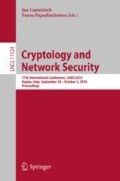Abstract
Code-based public-key cryptosystems based on QC-LDPC and QC-MDPC codes are promising post-quantum candidates to replace quantum-vulnerable classical alternatives. However, a new type of attacks based on Bob’s reactions have recently been introduced and appear to significantly reduce the length of the life of any keypair used in these systems. In this paper we estimate the complexity of all known reaction attacks against QC-LDPC and QC-MDPC code-based variants of the McEliece cryptosystem. We also show how the structure of the secret key and, in particular, the secret code rate affect the complexity of these attacks. It follows from our results that QC-LDPC code-based systems can indeed withstand reaction attacks, on condition that some specific decoding algorithms are used and the secret code has a sufficiently high rate.
P. Santini—The work of Paolo Santini was partially supported by Namirial S.p.A.
Access this chapter
Tax calculation will be finalised at checkout
Purchases are for personal use only
References
Aragon, N., et al.: BIKE: Bit Flipping Key Encapsulation. NIST Post-Quantum Cryptography Project: First Round Candidate Algorithms, December 2017. http://bikesuite.org/
Baldi, M., Bodrato, M., Chiaraluce, F.: A new analysis of the McEliece cryptosystem based on QC-LDPC codes. In: Ostrovsky, R., De Prisco, R., Visconti, I. (eds.) SCN 2008. LNCS, vol. 5229, pp. 246–262. Springer, Heidelberg (2008). https://doi.org/10.1007/978-3-540-85855-3_17
Baldi, M., Santini, P., Cancellieri, G.: Post-quantum cryptography based on codes: state of the art and open challenges. In: 2017 AEIT International Annual Conference, pp. 1–6, September 2017
Baldi, M., Barenghi, A., Chiaraluce, F., Pelosi, G., Santini, P.: LEDApkc: Low dEnsity coDe-bAsed public key cryptosystem. NIST Post-Quantum Cryptography Project: First Round Candidate Algorithms, December 2017. https://www.ledacrypt.org/
Baldi, M., Barenghi, A., Chiaraluce, F., Pelosi, G., Santini, P.: LEDAkem: a post-quantum key encapsulation mechanism based on QC-LDPC codes. In: Lange, T., Steinwandt, R. (eds.) PQCrypto 2018. LNCS, vol. 10786, pp. 3–24. Springer, Cham (2018). https://doi.org/10.1007/978-3-319-79063-3_1
Baldi, M., Bianchi, M., Chiaraluce, F.: Security and complexity of the McEliece cryptosystem based on QC-LDPC codes. IET Inf. Secur. 7(3), 212–220 (2012)
Becker, A., Joux, A., May, A., Meurer, A.: Decoding random binary linear codes in 2n/20: how \(1+1=0\) improves information set decoding. In: Pointcheval, D., Johansson, T. (eds.) EUROCRYPT 2012. LNCS, vol. 7237, pp. 520–536. Springer, Heidelberg (2012). https://doi.org/10.1007/978-3-642-29011-4_31
Berlekamp, E., McEliece, R., van Tilborg, H.: On the inherent intractability of certain coding problems. IEEE Trans. Inf. Theory 24(3), 384–386 (1978)
Bernstein, D.J.: Grover vs. McEliece. In: Sendrier, N. (ed.) PQCrypto 2010. LNCS, vol. 6061, pp. 73–80. Springer, Heidelberg (2010). https://doi.org/10.1007/978-3-642-12929-2_6
Eaton, E., Lequesne, M., Parent, A., Sendrier, N.: QC-MDPC: a timing attack and a CCA2 KEM. In: Lange, T., Steinwandt, R. (eds.) PQCrypto 2018. LNCS, vol. 10786, pp. 47–76. Springer, Cham (2018). https://doi.org/10.1007/978-3-319-79063-3_3
Fabšič, T., Hromada, V., Stankovski, P., Zajac, P., Guo, Q., Johansson, T.: A reaction attack on the QC-LDPC McEliece cryptosystem. In: Lange, T., Takagi, T. (eds.) PQCrypto 2017. LNCS, vol. 10346, pp. 51–68. Springer, Cham (2017). https://doi.org/10.1007/978-3-319-59879-6_4
Fabsic, T., Hromada, V., Zajac, P.: A reaction attack on LEDApkc. Cryptology ePrint Archive, Report 2018/140 (2018). https://eprint.iacr.org/2018/140
Gallager, R.G.: Low-Density Parity-Check Codes. MIT Press, Cambridge (1963)
Guo, Q., Johansson, T., Stankovski, P.: A key recovery attack on MDPC with CCA security using decoding errors. In: Cheon, J.H., Takagi, T. (eds.) ASIACRYPT 2016. LNCS, vol. 10031, pp. 789–815. Springer, Heidelberg (2016). https://doi.org/10.1007/978-3-662-53887-6_29
Kobara, K., Imai, H.: Semantically secure McEliece public-key cryptosystems -conversions for McEliece PKC. In: Kim, K. (ed.) PKC 2001. LNCS, vol. 1992, pp. 19–35. Springer, Heidelberg (2001). https://doi.org/10.1007/3-540-44586-2_2. citeseer.ist.psu.edu/kobara01semantically.html
May, A., Meurer, A., Thomae, E.: Decoding random linear codes in \(\tilde{\cal{O}}(2^{0.054n})\). In: Lee, D.H., Wang, X. (eds.) ASIACRYPT 2011. LNCS, vol. 7073, pp. 107–124. Springer, Heidelberg (2011). https://doi.org/10.1007/978-3-642-25385-0_6
McEliece, R.J.: A public-key cryptosystem based on algebraic coding theory. DSN Progress Report, pp. 114–116 (1978)
Misoczki, R., Tillich, J.P., Sendrier, N., Barreto, P.S.L.M.: MDPC-McEliece: new McEliece variants from moderate density parity-check codes. In: 2013 IEEE International Symposium on Information Theory, pp. 2069–2073, July 2013
National Institute of Standards and Technology: Post-quantum crypto project, December 2016. http://csrc.nist.gov/groups/ST/post-quantum-crypto/
Prange, E.: The use of information sets in decoding cyclic codes. IRE Trans. Inf. Theory 8(5), 5–9 (1962)
Shooshtari, M.K., Ahmadian-Attari, M., Johansson, T., Aref, M.R.: Cryptanalysis of McEliece cryptosystem variants based on quasi-cyclic low-density parity check codes. IET Inf. Secur. 10(4), 194–202 (2016)
Stern, J.: A method for finding codewords of small weight. In: Cohen, G., Wolfmann, J. (eds.) Coding Theory 1988. LNCS, vol. 388, pp. 106–113. Springer, Heidelberg (1989). https://doi.org/10.1007/BFb0019850
Acknowledgment
The authors wish to thank Tomáš Fabšič for fruitful discussion about the FHZ attack.
Author information
Authors and Affiliations
Corresponding author
Editor information
Editors and Affiliations
Rights and permissions
Copyright information
© 2018 Springer Nature Switzerland AG
About this paper
Cite this paper
Santini, P., Baldi, M., Chiaraluce, F. (2018). Assessing and Countering Reaction Attacks Against Post-Quantum Public-Key Cryptosystems Based on QC-LDPC Codes. In: Camenisch, J., Papadimitratos, P. (eds) Cryptology and Network Security. CANS 2018. Lecture Notes in Computer Science(), vol 11124. Springer, Cham. https://doi.org/10.1007/978-3-030-00434-7_16
Download citation
DOI: https://doi.org/10.1007/978-3-030-00434-7_16
Published:
Publisher Name: Springer, Cham
Print ISBN: 978-3-030-00433-0
Online ISBN: 978-3-030-00434-7
eBook Packages: Computer ScienceComputer Science (R0)

